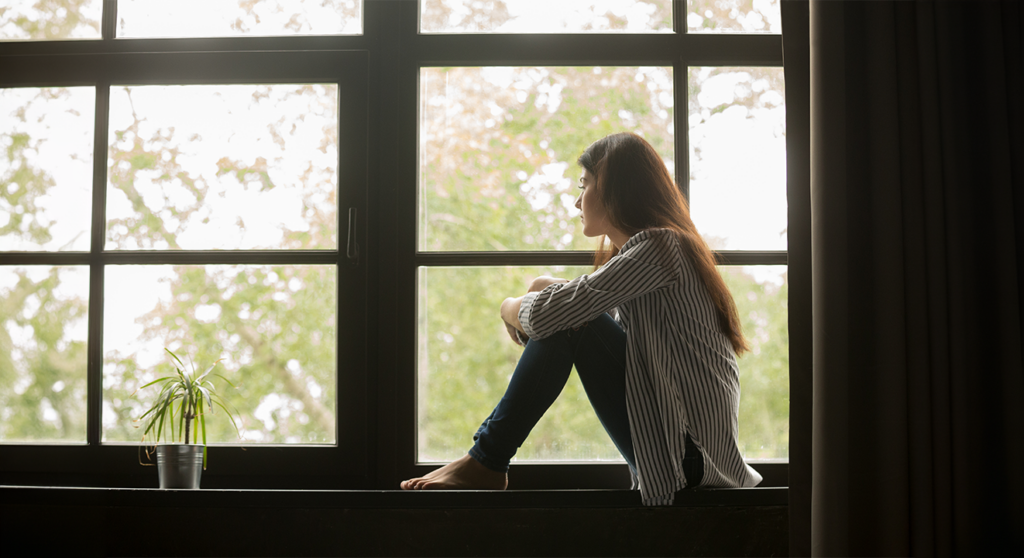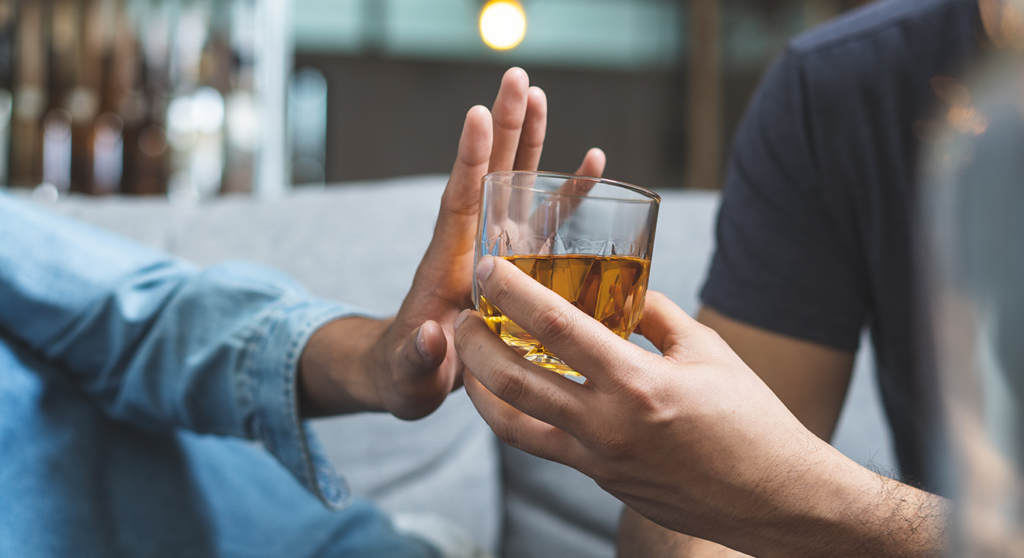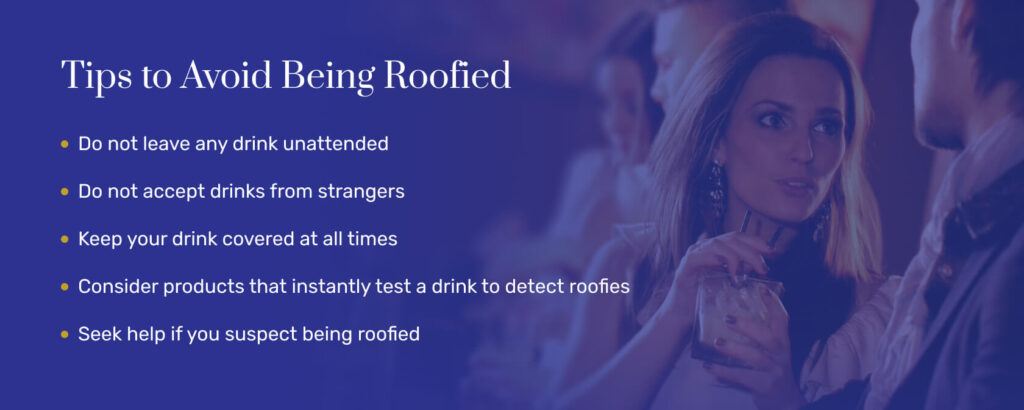
If you’ve been roofied (or had your drink spiked with drugs), you might experience mental fogginess, muscle relaxation, and blackouts. These symptoms are similar to those you’d feel if you drank too much. However, you may have been roofied if the symptoms are stronger than expected based on the amount you drank.
Roofies are dangerous because they often involve central nervous system depressants, which can significantly impair your ability to function and react. These drugs, designed to sedate and incapacitate, are commonly used to facilitate crimes like sexual assault. For individuals recovering, our New Jersey addiction treatment center can provide trauma-informed care and medical support.
The prevalence of being roofied is alarmingly high, making it crucial to understand the dangers and be aware of the signs. Knowing how to recognize and respond to the symptoms can help protect you and others from harm.
Key Facts
- “Roofie” is slang for sedating drugs slipped into drinks to facilitate sexual assault or other crimes.
- Common symptoms of being roofied include brain fog, compromised judgment, muscle relaxation, disorientation, and excessive intoxication.
- Immediate side effects of these drugs can include drowsiness, loss of muscle control, loss of consciousness, and memory impairment.
- If you suspect you’ve been roofied, call 911 immediately and try to rehydrate. Avoid consuming any more alcohol.
- If you suspect someone else has been roofied, call 911. Stay with the person, offer fluids, and ensure they remain in a safe environment until help arrives.

Roofied Meaning
Being roofied is a phrase associated with being drugged against one’s will. The term roofie is generic slang to depict a tablet of a sedative and hypnotic drug used illicitly for the purposes of committing sexual assault or other crimes.
Which Drugs Are Used?
Several drugs can fall into the roofie category. They share similar characteristics. Most are sedating substances that cause retroactive amnesia. Assailants use them to incapacitate their victims and ensure they can’t make accurate police reports after the assault.
Common drugs used as roofies include the following:
- Rohypnol: The benzodiazepine drug flunitrazepam is sold under the brand name Rohypnol. This drug treats severe insomnia and is sometimes prescribed as an anesthetic. It’s known for its powerful sedative effects and ability to cause amnesia, making it a common choice for assailants.
- Ketamine: Ketamine is a dissociative anesthetic drug used in both human and veterinary medicine. Doctors sometimes use it to treat severe depression or chronic pain. However, when abused, it can cause hallucinations, disconnection from reality, and profound sedation. It’s often referred to as “special K” on the streets.
- Gamma-hydroxybutyrate (GHB): GHB is an illegal drug in the sedative class. It produces feelings of euphoria, relaxation, and sociability. While it has limited medical use for conditions like narcolepsy, it’s commonly abused for its strong sedative and amnesiac effects.
- Etizolam: This drug is similar to benzodiazepines and works as an anticonvulsant and muscle relaxer. It’s used medically for anxiety and insomnia but is abused for its potent sedative properties.
- Clonazepam: The brand-name drug Klonopin contains clonazepam, a benzodiazepine used to treat panic disorder, anxiety, and seizures. It can cause significant sedation and amnesia when abused.
- Xanax (Alprazolam): Xanax is a widely prescribed benzodiazepine for anxiety and panic disorders. It’s known for its rapid sedative effects, which can lead to amnesia and loss of consciousness when used improperly.
- Valium (Diazepam): Valium is another benzodiazepine commonly used to treat anxiety, muscle spasms, and seizures. Its sedative effects make it a target for abuse in incapacitating victims.
Roofie Statistics
Understanding the prevalence of drink spiking and its associated risks can help raise awareness and drive prevention efforts. Here are some detailed and varied statistics that highlight the scope of this issue:
11%
In the U.K., 11% of women claim to have been a victim of roofies or drink spiking.
1 in 13
In a study of college students, more than 1 in 13 reported being drugged.
68 Seconds
The Rape, Abuse & Incest National Network (RAINN) reports that every 68 seconds, an American is sexually assaulted.
50% of Women and 33% of Men Experience S.A.
According to the Centers for Disease Control and Prevention, sexual violence occurs to millions of individuals in the United States every year. About half of women have or will experience sexual assault that involves some form of physical contact over the course of their lives. As for men, one in three will have experienced a sex crime committed against them.
1 in 6 Women Are Assaulted
Even in a seemingly innocuous state like Utah, public health data resources suggest that one in six women experience rape (a figure that also includes attempted rape) during their lifetime.
How To Tell If You Were Roofied
Understanding how to recognize the symptoms of being roofied is crucial for your safety and well-being. The drugs commonly used to spike drinks are central nervous system depressants, which means they slow down brain activity, leading to various physical and mental impairments.
The central nervous system (CNS) is responsible for processing information and controlling most functions of the body and mind.
When CNS depressants like Rohypnol, GHB, or Ketamine are ingested, they disrupt normal brain activity, causing significant impairments. These drugs can induce drowsiness, relaxation of muscles, and a state of disorientation, making it difficult for the victim to function normally or even remember what happened.
Symptoms of Being Roofied
Many common date rape drugs come in the form of pills, powders, or liquids. They are often odorless and colorless when added to food or beverages. In many cases, it’s difficult to know when a drink or food item has been roofied.
Victims might experience the following signs of being roofied.
| Mental Symptoms | Physical Symptoms | Behavioral Symptoms |
|---|---|---|
| Confusion | Sedation | Increased anxiety |
| Paranoia | Stumbling or staggering | Increased sex drive |
| Indecisiveness | Slow breathing rates | Panic |
| Hallucinations | Muscle relaxation | Slow reaction times |
| Memory loss | Intensified hangover | Difficulty speaking |
Here is a more detailed explanation of what you might notice when you or someone you know suspects they have been roofied:
Mental symptoms:
- Confusion and disorientation: Victims often feel confused and disoriented, unable to think clearly or remember events.
- Memory loss: Retroactive amnesia is common, where the next day, the victim cannot recall what happened during the period of intoxication.
- Paranoia and anxiety: Heightened feelings of fear, panic, or anxiety may occur.
Physical symptoms:
- Loss of muscle control: Victims may experience muscle relaxation to the point where they cannot stand or move properly, often stumbling or staggering.
- Drowsiness and sedation: Extreme tiredness and an overwhelming need to sleep are typical.
- Slow breathing rates: Breathing may become slow and shallow, posing a risk of respiratory issues.
- Difficulty speaking: Slurred speech or trouble articulating thoughts can occur.
Behavioral symptoms:
- Compromised judgment: Victims may engage in risky behaviors they would typically avoid.
- Increased anxiety and panic: Sudden, intense feelings of anxiety or panic attacks can happen.
- Inhibition: Reduced inhibitions might lead to uncharacteristic behavior.
What to Do if You Think You’ve Been Roofied
If you suspect you’ve been roofied, take immediate and deliberate actions to protect yourself and preserve any potential evidence.
Steps to take:
- Call 911: As soon as you suspect you’ve been drugged, call 911 for emergency assistance. Getting help from medical professionals is the top priority.
- Seek medical care: It’s essential to get medical attention as soon as possible. A healthcare provider can perform a medical examination to determine if you have been sexually assaulted and to check for any harmful effects of the drug.
- Stay hydrated: While waiting for help to arrive, drink water to stay hydrated, which can help mitigate some of the drug’s effects.
- Avoid activities that compromise evidence: Refrain from showering, changing clothes, or cleaning up in any way before medical professionals can collect evidence. Preserving evidence is crucial for any potential legal actions.
- Contact a trusted friend: Reach out to a trusted friend or loved one to let them know your situation. They can provide emotional support and help ensure you stay safe.
- Ensure a safe place: Stay where you are unless you are in immediate danger. If you’re in an unsafe environment, move to a safe place and wait for help. Don’t attempt to operate a vehicle or any machinery.
Important do’s and don’ts:
| Do This | Don’t Do This |
|---|---|
| Call 911 | Drive to change your location |
| Seek medical care immediately | Attempt to take more medication of any kind |
| Drink water | Drink more alcohol |
| Stay in your same clothes | Shower or change clothes before seeking medical care |
| Stay where you are (if it’s safe to do so) | Move if you’re not in danger |
How to Help Someone Who Has Been Roofied
If you suspect someone has been roofied or given a date rape drug, there are a few critical steps you can take to ensure their safety and well-being.
Take the following steps:
- Ensure safety: First, make sure the person is in a safe environment. If the current location is unsafe, move them to a safer place if possible.
- Offer water or another nonalcoholic beverage: Help them stay hydrated by offering water or another nonalcoholic beverage. Avoid giving them anything with alcohol.
- Ask what happened: Try to gather information by calmly asking what they remember and how they feel. This can help medical professionals better understand the situation.
- Note their physical and mental health symptoms: Observe and document symptoms such as confusion, disorientation, loss of muscle control, drowsiness, or any other unusual behavior.
- Call 911: Immediately call 911 to report the situation and get professional help. Provide all the details you’ve gathered about the person’s symptoms and what they remember.
- Get them to an emergency room: Take them to the nearest emergency room for immediate medical care if the person’s condition seems to be deteriorating or emergency services advise you to do so.
- Stay with the person until help arrives: Stay by their side to provide support and ensure they don’t harm themselves. Your presence can also help reassure them during this stressful situation.
- Avoid activities that could compromise evidence: If a crime is suspected, try to avoid any actions that could compromise evidence. This includes avoiding washing clothes or cleaning any potential evidence on the person.
By following these steps, you can provide immediate and effective assistance to someone who may have been roofied, ensuring their safety and helping them get the medical care they need.


Tips to Avoid Being Roofied
Avoidance is the best roofie defense. Stick with friends and those you trust to ensure your safety in party situations.
Additional prevention measures include the following:
Don’t leave drinks unattended: Always keep an eye on your drink. If you need to step away, take your drink with you or ask a trusted friend to watch it.
Never accept a drink from a stranger: Only accept drinks from bartenders or servers in sealed containers or bottles.
Keep your drink covered: When not sipping, use a coaster or your hand to cover your drink to prevent someone from slipping something into it.
Use date rape drug testing strips: These strips can detect common date rape drugs in your drink. Carry them with you and use them if you feel uncertain about your drink’s safety.
Monitor your own drinks: Pour your own drinks whenever possible and keep them within sight. This helps ensure no one tampers with your drink.
Stay aware of your surroundings: Pay attention to what’s happening around you. If you notice anything suspicious or feel uncomfortable, trust your instincts and remove yourself from the situation.
Stay in groups: Stick with friends and keep an eye on each other. Arrive together, stay together, and leave together.
Be cautious of shared containers: Avoid drinking from punch bowls or other large, shared containers, which can be easily spiked without detection.
Be cautious of shared containers: Avoid drinking from punch bowls or other large, shared containers, which can be easily spiked without detection.
Trust your instincts: If something feels off about a drink or a situation, don’t hesitate to leave it behind or seek help.
Use a buddy system: Pair up with a friend and agree to watch each other’s drinks and well-being throughout the night.
Keep emergency contacts handy: Have the contact information of trusted friends and emergency services saved and easily accessible on your phone.
Educate yourself and others: Stay informed about the signs of drink spiking and educate your friends to increase collective vigilance.
Following these preventive measures can significantly reduce the risk of being roofied and ensure a safer social environment for yourself and your friends.
Potential Long-Term Effects of Roofies or Date Rape Drugs
While most people recover from a single episode of being roofied without long-term physical challenges, the psychological impact can be profound.
Experiencing or fearing an assault can lead to post-traumatic stress disorder (PTSD), with symptoms including flashbacks, severe anxiety, and avoidance of places or situations that trigger memories of the event. This can significantly disrupt daily life, causing victims to withdraw from social interactions and feel uncomfortable in social settings.
Anxiety and depression are also common among victims, who may experience persistent feelings of sadness and hopelessness. Additionally, the trauma can lead to substance abuse as a coping mechanism, potentially resulting in addiction.
Repeated exposure or self-medication with drugs and alcohol necessitates professional addiction treatment and detoxification to manage withdrawal symptoms and begin recovery.
Seeking help from mental health professionals is crucial for processing the trauma and reducing symptoms of PTSD. Therapy and support groups can provide the necessary support and understanding to help victims regain confidence and enjoy social occasions once again.
Immediate and long-term psychological support is essential for recovery, ensuring victims receive comprehensive care to reclaim their sense of safety and well-being.
Date Rape & Sexual Assault Support Resources
If you believe you or someone you know has been slipped a roofie or date rape drug, or experienced any form of sexual assault, these support options are available:
RAINN
RAINN is the Rape, Abuse & Incest National Network. It’s a valuable anti-sexual assault resource. RAINN provides a convenient chat feature as well as the National Sexual Assault Hotline for those who believe they have fallen victim to sexual assault.
National Sexual Violence Resource Center
NSVRC provides resources and tools for survivors of sexual violence, educators, advocates, and friends and family members.
State-specific resources
Many states also have their own sexual assault hotlines and support services. Depending on your state of residence, there may be multiple resources you can explore to obtain the support and direction you need after experiencing sexual assault of any kind.
Treatment centers
Specialized treatment centers offer comprehensive care for survivors of sexual assault, including medical treatment, counseling, and support services. These centers can help address both physical and psychological needs.
Staying Informed and Protected
Being roofied is a serious and frightening experience that can have immediate and long-lasting effects on both the body and mind. Understanding the symptoms, knowing how to react, and taking preventative measures are crucial steps in protecting yourself and others.
If you suspect you’ve been drugged, seek immediate medical care, contact a trusted friend, and ensure your safety.
Remember, you are not alone—there are numerous resources and support systems available, including the national sexual assault hotline and local treatment centers.
By staying informed and vigilant, we can work together to prevent these crimes and support those affected by them.
If you or someone you love has been roofied, we’re here to help. We have certified counselors and medical professionals available to guide you toward healing and reclaiming your strength. Contact us today or check out our Florida detox center to learn more.
- Ibbetson, C. One in nine women say they have had their drink spiked. YouGov.UK. Published November 18, 2021. Accessed June 22, 2023.
- Fast facts: Preventing sexual violence. Centers for Disease Control and Prevention. Published June 22, 2022. Accessed June 22, 2023.
- Health indicator report of sexual violence. Utah Department of Health and Human Services. Published November 4, 2021. Accessed June 22, 2023.
- Swan S, Woodbrown V, Schramm A, Warren P, Lasky N, Fisher B, Bonsu J, Coker A, Williams C. Just a dare or unaware? Outcomes and motives of drugging (“drink spiking”) among students at three college campuses. Psychology of Violence. 2017, Vol. 7, No. 2, 253–264.
- Beynon, C., Edwards, S., Morlen, M., Anderson, Z., & McVeigh, J. (2005). Drink Spiking Report. Centre for Public Health, Liverpool John Moores University
















